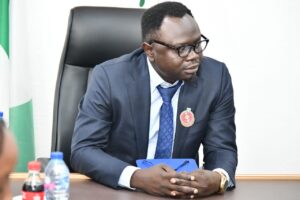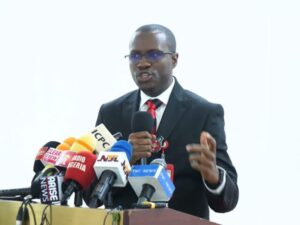Guns proliferation: Nigerian Navy disowns officer over allegations against Chadian soldiers
…Declares officer’s statement as “personal, unauthorized”
…Insists Chad remains a veritable force in fight against insurgency
By Uthman Salami
The Nigerian navy has disowned an allegation made during parliament session by one of its senior officers that soldiers from neighbouring country, Chad were selling weapons for $20 or $30, thereby contributing to the spate of unrest in Northern part of the country.
The Force described the widely televised allegations, made by Commodore Jamila Abubakar Sadiq Malafa during a public hearing held by an adhoc House of Representatives Adhoc committee, describing it as “unauthorised, personal comments.”
They stressed that the statement did not reflect the Navy’s position.
Earlier on Monday, while speaking during a public hearing by the House of Representatives Committee on National Security and Intelligence in Abuja, the Director of Legal Services, Nigerian Navy, Commodore Jemila Malafa, had accused the Chadian soldiers of selling guns for as low as $20 (N8,200), saying that it endangered Nigeria’s security.
According to her, “Some of these countries that we have a border with have no armoury. They do not have armoury. So most of their arms that are being donated by — I don’t want to be specific — the developed countries in the name of assisting us to fight our problems — are compounding our problems in Nigeria because you find out that each average Chadian soldier has 20 to 30 arms underneath his bed.”
She added that, “Since we are going to collaborate with ECOWAS and other countries that are donating such arms to these countries [African countries], I think we should insist that they should either enact laws to govern the handling of these arms and ammunition or build an armoury for these countries or else we will not see peace.”
Commodore Malafa suggested that a border wall should be built between Nigeria and these neighbouring countries including Chad or the government should have serious surveillance, saying that if all these are not done “we will not see peace in this country.”
The hearing was organised by the Adhoc committee to take the input of the public on four bills on national security.
The bills are: A Bill to Establish the National Commission Against the Proliferation of Small Arms and Light Weapons; A Bill to Make Provision for the Integration of Private Closed Circuit Television (CCTV); A Bill to Repeal the Explosives Act, and A Bill to Designate the Month of November as the National Appreciation for Security Agencies Month.
However, in a swift reaction, the Nigerian Navy said Nigerian and Chadian militaries have been cooperating in the fight against all sorts of insurgents such as Boko Haram and Islamic State, which they said were causing serious security issues in both countries.
In a statement issued on behalf of the chief of the naval staff, the Nigerian Navy said, “The Nigerian Navy appreciates the indelible contributions of our regional partners/neighbours in the fight against small arms and light weapons trafficking,”
The Military spokesperson, Azem Bermendao Agouna said, “Nobody is better placed than Chadian soldiers to know that selling arms to civilians and terrorist groups would seriously undermine regional security for which they continue to make heavy sacrifices.”
Malafa gained a high profile in Nigeria in 2017 when she became the first woman from the predominantly Muslim north to be elevated to the rank of commodore. She was widely profiled in the media at the time.
During her appearance on Monday, she alleged that Chadian soldiers kept their weapons under their beds for lack of an armoury and that, when broke, they sold them. She said Nigeria would see no peace as long as this carried on.
The Navy said it wanted to dissociate itself from comments about “neighbours with which Nigeria maintains solid diplomatic security relationships/collaborations.”
According to the United Nations Development Programme (UNDP) report, the Northeast Nigeria’s conflict with Islamist insurgencies had killed nearly 350,000 people as of the end of 2020,
The death toll, given by the U.N. agency in a new study on the war and its impact on livelihoods, is ten times higher than previous estimates of about 35,000 based only on those killed in fighting in Nigeria since the conflict’s start 12 years ago.
In another report released with Nigeria’s Ministry of Finance, the UNDP said, “The full human cost of the war is much greater.
“Already, many more have died from the indirect effects of the conflict,” said the UNDP, citing damage to agriculture, water, trade, food and healthcare.
The agency revealed in its report that children younger than five account for more than nine out of 10 of those killed, with 170 dying every day, insisting that, “if the conflict continues to 2030, more than 1.1 million people may die. “




